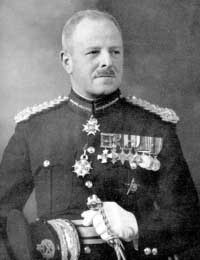Major General JY Whitfield CB DSO OBE
 |
In the death of Major General John Whitfield The Queen's Regiment has lost one of its best-loved, most highly respected and distinguished sons.
John Yeldham Whitfield was born on 11th October, 1899, and educated at Monmouth School and the Royal Military College, Sandhurst. He was commissioned into The Queen's Royal Regiment in December 1918 and thereafter served for many years, both in West and East Africa.
In 1942 he returned to England to take command of a battalion of his Regiment in The Queen's Brigade of 56 (London) Division. This battalion he took to Iraq and to the closing stages of the 8th Army's Campaign in North Africa; to Europe and the assault landing at Salerno, thence across the Volturno to Monte Camino. It was in the capture of the Monte Camino monastery that he personally led the attack exchanging shots with the Germans with his pistol while advancing from rock to rock. He was fortunately, not a large target, but as the developing war and later peace were to show, he was a very valuable one.
None who served with J.Y. will forget his tireless energy, thoroughness, complete fearlessness, but above all, the faith which illuminated a comparatively frail body, but massively unconquerable spirit.
In January 1944, having acted as Brigade Commander on and off since Salerno, he was finally re-promoted Brigadier (he had been Brigadier General Staff to- General Sir George Giffard in West Africa until his return to England in 1942). As a Brigade Commander in the 5th Division he fought on the Garigliano and through three testing months at Anzio.
In July he had a few days away from battle when he took 15 Brigade to Egypt. Although a fine staff officer and administrator, he could not be kept from command for long; in fact his next appointment as BGS, 5 Corps, in Italy, to which he then returned, he held for some fifteen days only. General Templer, Commander, 56 (London) Division, had been recalled to England. In a matter of minutes,
On the 26th July, 1944, he handed over command to Major General John Whitfield at the Eden Hotel, Rome, with a toast to his and the Division's success, drunk by them both in Italian champagne. So began the long and dedicated association of John Whitfield with the Black Cat Division of whose dinner club he later became the chairman.
From August 1944 he was more or less continuously in action during the last stages of the Italian campaign:
Gothic line, Senio battles, crossing the Rubicon into the Northern plains of Italy until he entered Venice at the head of his Division in March 1945. The Grand Hotel on the Grand Canal provided a worthy headquarters for him, and there he remained until the Division was moved to Trieste on the borders of Yugoslavia.
In 1946, after two years and two months as GOC 56 Division, he returned to England to command 50th Northumberland Division and Northumbrian District He then became Chief of Staff, Northern Command until his retirement in 1951; but from 1951 to 1955 he was specially re-employed as Inspector of Recruiting at the War Office.
Although the Regiment was always his first love, he undertook many commitments of a service nature. He presided over the 56th Division dinner club until 1970, by which time he was so incapacitated that even his indomitable will could not allow him to attend its gatherings. It was time for a hand-over once more—in fact, to Field Marshal Sir Gerald Templer. He was also chairman of the Royal West African Frontier Forces and the King's African Rifles dinner clubs, and, in addition, a very active member of the executive committee of the Forces Help Society and Lord Roberts' Workshop.
Of the many honours he received he was awarded the Order of the Red Star after a party of visiting Russian generals had stood in admiration of the fighting qualities of his Division on the Camino battlefield in 1944, he valued most his appointment as Colonel of his old Regiment. It transpired that he was to be the last Colonel of The Queen's Royal Regiment, for the line begun by the Earl of Peterborough in 1661 ended with him when the Regiment was amalgamated on 14th October, 1959. He played his part in the parade that day although he could not see the Duke of Edinburgh present the new Regiment with its new Colours. For John Whitfield was by then-quite blind.
He had been almost continuously in action from April 1943 until April 1945. His courage was legendary. His faith overcame all possibility of fear, and he remained un-touched by shot or shell. However the courage he showed in battle was never greater than that he showed in peace when so cruelly struck down by diabetes and the subsequent blindness which, in his case, accompanied it; later strokes and paralysis. Few can imagine how he suffered during his last ten years. None ever heard a word of complaint about his suffering—'I am going on as well as can be expected ‘on my one cylinder', he would say.
John Whitfield married Sheelagh Norah Dundan Quin of Inch, County Wexford, nursed him through those last long dark years of courageous suffering with a loyal and loving devotion which cannot often have been equaled in any walk of life.
Major General Whitfield died on 23rd September 1971 and his Regiment The Queen's Regiment has lost one of its best-loved, most highly respected and distinguished sons.
Read more about the Major General Whitfield »
Related
